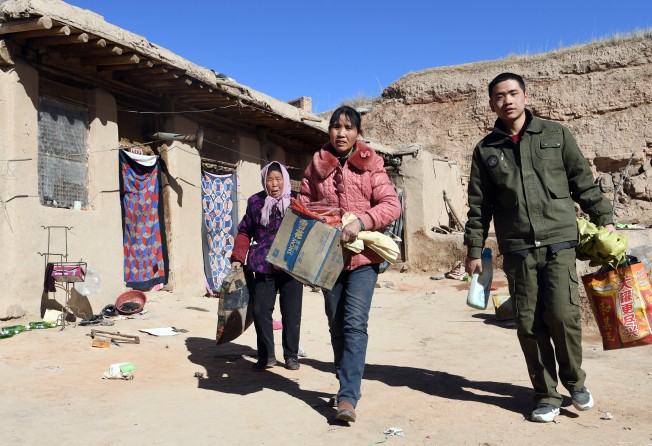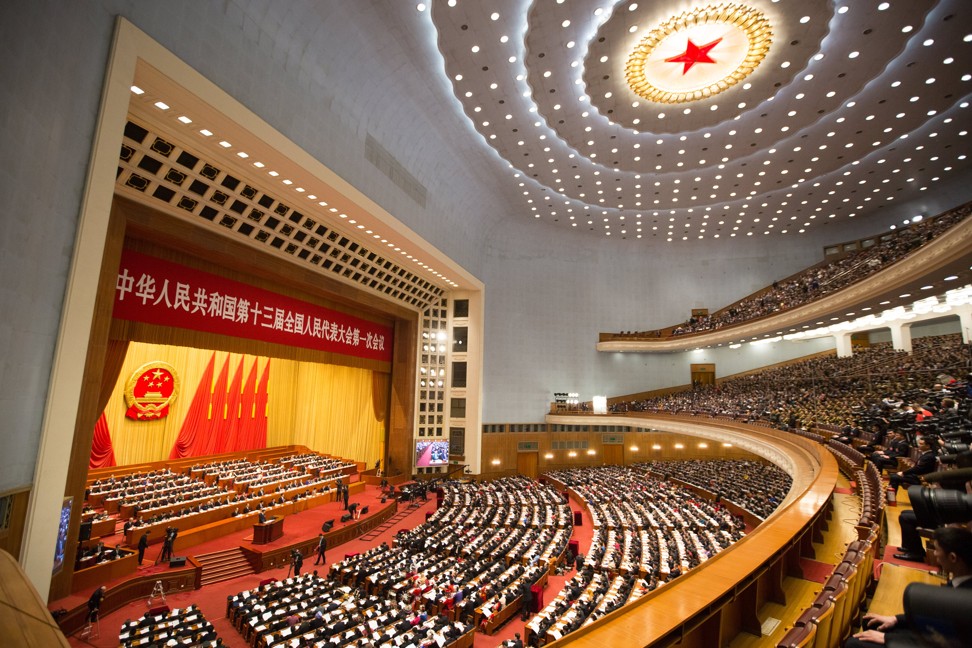China reaffirms goals to rebalance economy, reduce poverty and improve the environment
Beijing has made significant progress towards realising President Xi Jinping’s targets, but work remains to be done, Li Keqiang tells NPC

China will continue to focus on supply-side reforms, financial risks, poverty and the environment this year and beyond in the drive for “high-quality growth”, Premier Li Keqiang said on Monday.
With an annual growth target of “about 6.5 per cent” for 2018, Li made it clear in his two-hour speech to the national legislature that the speed of economic expansion was less of a worry now that the risk of a hard landing had faded.
Li told the 3,000 or so delegates to the National People’s Congress that China had already made significant progress in rebalancing its economy, taming financial risks, reducing poverty and curbing pollution over the past five years, but more needed to be done to realise President Xi Jinping’s goals.
“In particular, we must achieve substantial progress in the tough battles of addressing big risks, poverty reduction and pollution prevention,” said Li, who is officially second in the Chinese leadership but is overshadowed by Xi and his allies.
The central government, he said, would try to contain financial risks partly by “striking hard against illegal fundraising” as well as curbing local government debt.
Li also made clear Beijing’s intent to move away from the traditional model of using government spending to drive growth by cutting the country’s fiscal deficit to GDP ratio for this year to 2.6 per cent, from 3 per cent in 2017.
On the matter of social welfare, Li said the government would seek to lift a further 10 million out of poverty in 2018, adding to the 86 million already relieved of that burden over the past five years.
The government would also continue with its plans to improve the environment, with the emphasis on reducing air pollution. To that end, all diesel trucks would be tested to ensure they met the latest standards on emissions, he said.
“We’ve negated the economic downward pressures and avoided a hard landing,” he said. “The bottom line is that there are no systemic risks, and we have maintained national economic and financial security.”
The government had also succeeded in rebalancing the world’s second-largest economy, steering it away from its dependence on manufacturing output, and increasing the contributions of consumer spending and the services sector, Li said.
“This is a significant structural change that we had [previously] tried but failed to achieve,” he said.
Speaking at a meeting with delegates from Inner Mongolia later on Monday, Xi reiterated Li’s comments and appealed to officials from the autonomous region to share the national vision.
As Beijing had shifted from high-speed growth to high-quality growth, and increased the emphasis on people’s welfare and the environment, so the regional government should lift its people out of poverty and do all it can to protect its grasslands and lakes, he said.
Also, as one of the most indebted regions in the country, Inner Mongolia should commit to a structured process of deleveraging, the president said.
During Li’s first five years as premier, China witnessed a massive expansion of its financial sector, but due to lax regulation, the growth was accompanied by a blurring of the traditional barriers between the banking, insurance and securities sectors, which created huge risks and forced Beijing to rethink the whole regulatory framework for the financial industry.
Li, who is expected to stay on as premier, said the government would this year continue with its plans to improve regulation of shadow banking, online funding platforms and financial conglomerates.
The National People’s Congress is the first time China’s lawmakers have congregated since Xi consolidated his grip on power at the 19th national congress in October.
At that twice-a-decade event, Xi established himself as China’s most powerful leader since Mao Zedong and has since been steering the country’s entire ruling apparatus – including the State Council, or cabinet, which comes under Li’s direct supervision – in the direction of his goal of a fairer, greener and more sustainable growth model under the “New Era”.
For the NPC meeting, the top two agenda items will be the Communist Party’s proposal to end the two-term limit for presidents and vice-presidents – effectively paving the way for Xi to stay in office indefinitely – and its plans for a leadership reshuffle, including the “election” of a premier, vice-premiers and assorted ministers.
Andrew Batson, an economist at Gavekal Dragonomics in Beijing, wrote that Xi’s consolidation of power was likely to be see a change in the behaviour of lower level officials, which had traditionally been a major factor influencing economic performance
“The benefit of Xi’s sloganeering is that it creates a political environment that will allow growth targets to be adjusted downwards more easily than in the past,” he said.
“And local government officials should no longer expect that overperforming on growth targets will be the best or only way to advance their careers.”
